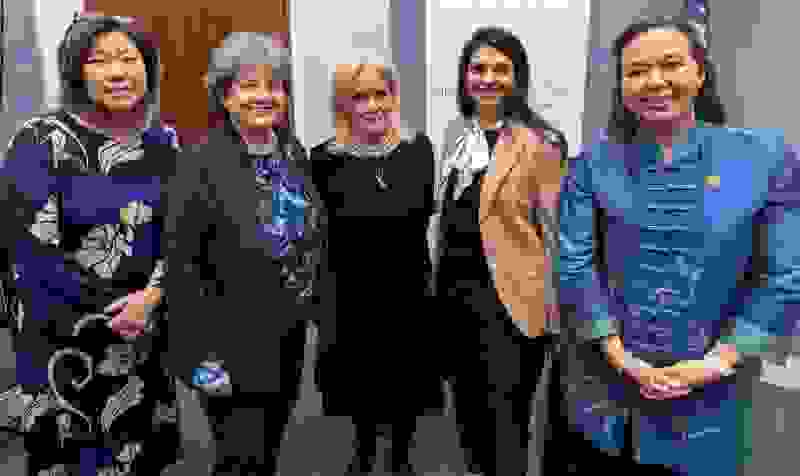Left to right: Representative Grace Meng, Representative Lois Frankel, Representative Debbie Dingell, OSF Vice President Sahana Dharmapuri, Representative Jill Tokuda at Our Secure Future’s February 2024 Hill Briefing on “Women, Peace and Security Policy Responses to Conflict-Related Sexual Violence Globally” Source: Our Secure Future (2024)
WASHINGTON, Aug. 19, 2024 (GLOBE NEWSWIRE) -- Our Secure Future has released its findings on a global poll about women’s perspectives on security. Conducted with the Women’s Alliance for Security Leadership/International Civil Society Action Network, the poll found that 82% of the women surveyed said that security discussions in their country do not represent them, and 80% said they do not feel adequately represented among security actors.
In countries like South Korea, Japan, and China, women often face significant barriers to participating in peace and security efforts, despite their critical perspectives and contributions in the workplace, political spaces, and even at the home front. Achieving gender equality is laden with obstacles deeply rooted in cultural norms and systemic inequalities. However, across Asia, societies are paving the way for a more equitable future for everyone.
During the 31st ASEAN Summit in 2017, the Joint Statement on Promoting Women, Peace and Security in ASEAN recognized the important role women have to play in peace building, conflict prevention, resolution and recovery in Asia. In 2022, the ASEAN Regional Plan of Action on Women, Peace and Security was released to further advance women’s rights. Asian countries are also contributing troops to United Nations peacekeeping missions, as mandated by UN Security Council Resolution 1325, on Women, Peace and Security. But women still face significant obstacles to full and equal participation.
One significant development is the growing number of Asian countries adopting National Action Plans (NAPs) on Women, Peace and Security (WPS). As of 2023, at least 16 Asian nations, including Japan, the Philippines, Indonesia, and South Korea, have developed NAPs to integrate gender perspectives into their peace and security policies.
NAPs serve as crucial roadmaps for governments to address the unique challenges faced by women in conflict and post-conflict situations and to promote their meaningful participation in security and peacebuilding processes.
Advancing the WPS Agenda in Japan
Today, Japan has taken a leading role in advancing the Women, Peace and Security (WPS) agenda in Asia. The Japanese Diet has adopted several significant WPS initiatives, demonstrating a strong commitment to integrating gender perspectives into peace and security frameworks.
In 2023, the Honorable Yoko Kamikawa was appointed as Japan’s Minister of Foreign Affairs. She has been pivotal in advancing national WPS initiatives. As the first female foreign minister in nearly two decades, Kamikawa brings a wealth of experience from her previous roles, including justice minister and minister of state for Gender Equality and Social Affairs.
In October 2022, during her time as a member of the Japanese Diet, Kamikawa launched the Diet Members' Network for Women, Peace and Security, a parliamentary caucus. Under her leadership, in January 2024, Japan's Ministry of Foreign Affairs also launched a dedicated task force on Women, Peace and Security. This cross-cutting task force aims to improve coordination on WPS efforts across various ministries and agencies, ensuring a cohesive, whole-of-government approach. Additionally, it seeks to integrate insights from external experts, including civil society organizations and international partners, to improve the effectiveness of Japan's WPS initiatives and policies.
Japan’s new WPS framework was inspired by the WPS Caucus model originated by the United States Congress. Recognizing the structural challenges in Congressional oversight, Our Secure Future (OSF) began engaging Congressional WPS leaders in 2019 to create a WPS Working Group on Capitol Hill. These efforts culminated in the formal launch of the Congressional Women, Peace and Security Caucus on March 9, 2020. This bipartisan group proves what can be achieved when members from both parties join forces.
Open to all members regardless of their committee assignments, the WPS Congressional Caucus serves as an effective interface for civil society with members of Congress. Civil society critically supports the Caucus's success by sharing public information and research, providing thematic expertise, and participating in Caucus events.
The 'WPS Caucus Model' has also been adopted by other parliamentary bodies, such as the 'All-Party Parliamentary Group on Women, Peace and Security” (APPG-WPS) in the U.K., demonstrating the growing recognition of the importance of cross-party parliamentary working groups in advancing the WPS agenda.
Adoption of a similar 'WPS Caucus Model' across other national legislatures can ensure accountability in implementing WPS National Action Plans and policies.
Japan's proactive approach to the WPS agenda can inspire other Asian countries, particularly those in the ASEAN region. With their diverse cultural backgrounds and political systems, the ASEAN member states face unique challenges in implementing the WPS agenda.
Japan's experience provides important lessons for the ASEAN region. ASEAN countries can prioritize the appointment of women in key leadership positions within their governments, especially in ministries and agencies related to peace and security. This step promotes gender equality and ensures that diverse perspectives are considered in decision-making processes.
ASEAN nations can also establish cross-ministerial task forces or working groups dedicated to the WPS agenda, similar to Japan's Taskforce on Women, Peace and Security. These entities can facilitate better coordination and collaboration among various government bodies, organizations, and external experts, leading to the implementation of more effective WPS policies and initiatives.
Moreover, establishing a regional WPS network within ASEAN could enhance collaboration and support sharing resources and expertise. This network would also serve as a platform for advocacy to raise awareness of the WPS agenda.
The world is grappling with complex conflicts and the disproportionate impact of violence on women and girls. Legislatures and society must work together to prioritize implementing the WPS agenda for a more secure future for all.
The recent bipartisan action in the U.S. House of Representatives condemning conflict-related sexual violence serves as a powerful reminder of the critical role that legislatures play in advancing the Women, Peace and Security agenda.
Sahana Dharmapuri, Vice President of Our Secure Future remarked, 'Establishing the bipartisan Congressional Women, Peace and Security Caucus and adopting similar models in other parliaments globally demonstrates the growing recognition of the importance of collaboration and dialogue in promoting women's participation in peacebuilding efforts.”
Asia has a unique opportunity to become a champion in advancing the WPS agenda. As the region faces various security threats, from armed conflicts to climate change-related disasters, prioritizing women's participation and leadership in decision-making is more crucial than ever.
Those interested in making a difference are encouraged to reach out to their local representatives, get involved with civil society organizations, and work together to create a safer, more equitable world for all.
Contact Information
Name: Emma Boggess
Email: eboggess@oneearthfuture.org
Organization: Our Secure Future
Website: https://oursecurefuture.org/
A photo accompanying this announcement is available at https://www.globenewswire.com/NewsRoom/AttachmentNg/79cb68a1-fba7-4fdc-9625-711b470197d3

















